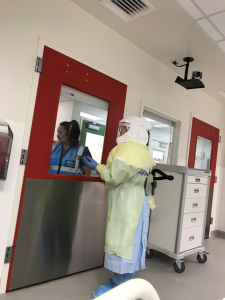 On Tuesday, February, the Biocontainment Unit hosted the National Ebola Training Center (NETEC) for its annual site assessment. Representatives from Nebraska Medical, Emory and New York Bellevue hospitals came together to discuss the progress the Johns Hopkins BCU has made in the last year and observed BCU staff in a full scale exercise, the Ocho drill. The Ocho drill was an eight-hour shift in which eight BCU nurses, six hospital epidemiology and infection control trained observers, four laboratory technicians, two radiology technicians and two providers cared for one patient in biocontainment. The eight-hour timeline was set to allow staff members a realistic simulation in which choreography of personnel and limits of personal protective equipment (PPE) were challenged.
On Tuesday, February, the Biocontainment Unit hosted the National Ebola Training Center (NETEC) for its annual site assessment. Representatives from Nebraska Medical, Emory and New York Bellevue hospitals came together to discuss the progress the Johns Hopkins BCU has made in the last year and observed BCU staff in a full scale exercise, the Ocho drill. The Ocho drill was an eight-hour shift in which eight BCU nurses, six hospital epidemiology and infection control trained observers, four laboratory technicians, two radiology technicians and two providers cared for one patient in biocontainment. The eight-hour timeline was set to allow staff members a realistic simulation in which choreography of personnel and limits of personal protective equipment (PPE) were challenged.
Caring for a patient in biocontainment is unique and complicated as special processes and precautions are taken to ensure that both the spread of disease and the risk to the healthcare worker are minimized. Simple tasks like the packaging and transport of waste out of a patient room or spill clean ups are practiced in enhanced PPE. These seemingly simple procedures require a team of nurses performing sequential steps through clear communication and direction. All activities and processes are observed by trained observers to ensure safe handling of hazardous waste and safe practices during patient care. The BCU staff were also challenged to provide patient-centered care to a live actor who portrayed the patient in isolation, infected with a high consequence respiratory pathogen. Balancing these stringent adaptations to clinical practice with attention to quality patient care is difficult as communication and contact are reduced by PPE and the risk of infection.
NETEC representatives commented on the growth and breadth of capacity the BCU demonstrated and encouraged the BCU team to disseminate practices and discoveries with the greater group. The work of the BCU team is ever evolving and continues to strive for best practice supported by research and evidence. Partnerships with NETEC in research and policy are ongoing and the BCU looks forward to more projects and collaboration with regional assessment hospitals as a center for training and education.

